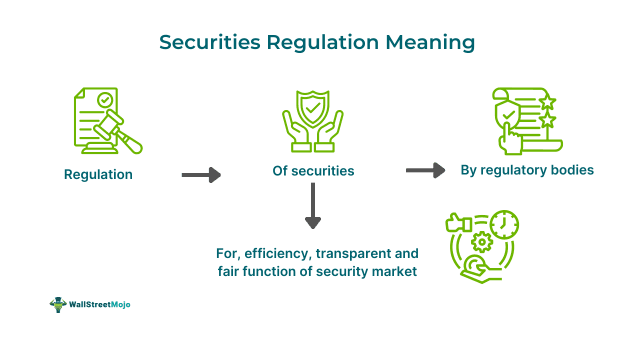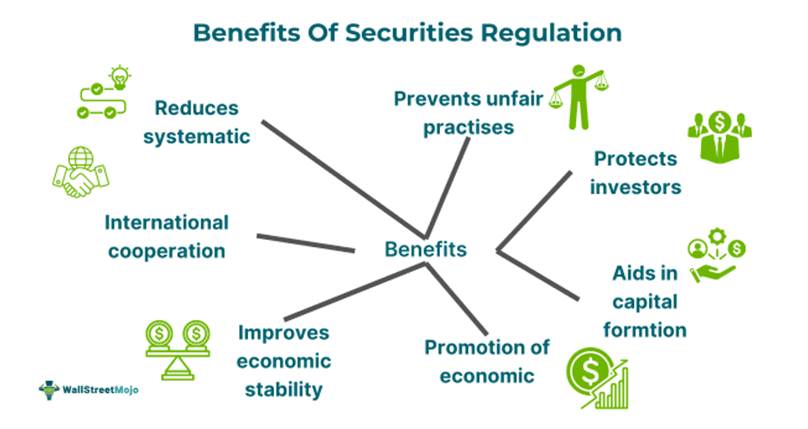Table of Contents
What Is Securities Regulation?
Securities regulation is a collection of state and federal statutes enforced by designated agencies. It includes restrictions on the exchange of securities, civil liabilities, disclosure requirements, and investor protection. The regulations also focus on reporting requirements, regulatory functions of the exchanges, investment companies, and broker-dealer regulations.

Effective regulation of securities is crucial for investor protection. They ensure the efficient functioning of the securities market and the participants involved in it. The regulations guide the markets to have healthy competition among local and national capital markets and help to contribute to the growth and development of the economy.
Key Takeaways
- Securities regulations are statutes, rules, and regulatory obligations that must be followed when dealing with securities. They involve the creation, trading, sale, or purchase of securities.
- The objectives of regulation are investor protection, ensuring a fair, transparent, and efficient financial market, and reducing risks.
- These regulations are in place to ensure investor protection, capital formation, a sustainable flow of capital, and the promotion of economic growth.
- The US regulatory body is the SEC. Regulatory bodies focus on the dissemination of necessary information, enabling the proper functioning of markets, eliminating unfair practices, etc.
Securities Regulation Explained
Securities regulation deals with laying down rules and guidelines regarding the trading process of securities. These rules focus on the functioning of the markets, investor protection, and ensuring transparent, fair, and efficient capital markets. They aim to protect investors and ensure fair, efficient, and transparent functioning of the markets. Proper regulation helps in reducing systematic risks. Similarly, a streamlined, simplified regulation reduces the burden of compliance on market participants.
The primary motive of government regulation on securities and the financial markets is the prevention of a collapse or market failure. This is because if markets are left unregulated, they will lose their competitive spirit, efficiency, credibility, and stability. It will eventually result in the withdrawal of firms and individuals from participation. Rules on the trading of securities save the market from facing the loss of participation and their viability, which would result in market failure.
Regulating securities would ensure the proper functioning of economies, attract individual and institutional savings, and grow capital investments. The stability achieved through this would strengthen the capital markets and eventually result in sustained economic growth. These securities and trading regulations help build investor and public confidence, which is vital for the well-being of the economy.
Regulations relating to securities differ from one country to another. In the U.S., the SEC or the Securities and Exchange Commission overlooks the elements relating to securities and the stock market. Various regulations have been established to ensure the same. The Securities Act (1933) is one such regulation that deals with the prohibition of deceit, fraud, and misinterpretations of the sale of securities. The Securities Exchange Act (1934) established the SEC. The Trust Indenture Act (1939) deals with the public sale of bonds, notes, and debentures.
Objectives and Principles
Objectives and principles as securities regulation outlines are given as follows:
Objectives
- Investor Protection: Investor protection is crucial, as investors are vulnerable to misconduct by intermediaries and other entities. They need necessary information to make the right investment choices. The regulations require licensed persons to provide investment services to support this. These rules help in effective supervision and enforcement of methodologies that ensure cooperation and compliance.
- Ensuring Fair, Efficient, And Transparent Markets: Fairness is related to investor protection and the prevention of improper trade practices. It prevents the market from favoring certain users and detects and deters market manipulation. By providing pre- and post-trade information in real-time, fairness ensures fair treatment, efficient functioning, and transparency of the market.
- Reduction Of Risks: Risk and failures are not preventable, but they can be reduced through internal and capital controls. In a system, regulation allows the isolation of the failing institution and prevents others from following it. The regulation placed hence will check excessive risk-taking, absorb losses, and put in place effective risk management tools.
Principles And Securities Regulation Outline
Principles can be divided, and some of them are given as follows:
- Regulator: The responsibilities shall be clearly defined, adequate powers shall be assigned, and the process shall be clear and consistent. It shall maintain regulation standards, monitor and mitigate risks, solve conflicts of interest, etc.
- Principles For Self-Regulation And Their Enforcement: The regulator shall oversee self-regulatory organizations and should observe standards of fairness and confidentiality. The regulators shall have power for inspection, surveillance, and investigation. It shall have enforcement powers and shall be credible.
- Cooperation In Regulation: The regulators shall have the authority to share public and non-public information with domestic and international counterparts. Necessary information-sharing mechanisms shall be set out, and assistance from foreign regulators shall be allowed whenever necessary.
- For Issuers: Timely, accurate, and full disclosure of financial results, risk, and related information should be guaranteed. Security holders shall be treated fairly. Accounting standards shall be internationally accepted.
- For Auditors, Service Providers And Credit Rating Agencies: Auditors shall be independent and have quality and educational qualifications. Credit rating agencies and service providers of investor analysis shall have adequate levels of oversight.
- For Collective Investment Schemes, Market Intermediaries And Secondary Markets: Under these, collective investment schemes, market intermediaries, and secondary markets shall have proper disclosures in place. Minimum entry standards for intermediaries, hedge funds, and managers shall be subject to oversight. Proper procedures and systems shall be established in the market. It shall detect and deter manipulation and other unfair practices.
Examples
Let us look at some examples to understand the concept better.
Example #1
Suppose there is a company XYZ. Located in the U.S., It was supposed to go public in a month. There is an upcoming merger post in which the stock prices are expected to rise. The employees in the company know these developments and are thrilled. However, since there are regulations in place, they will not be able to trade based on such information. The employees are not supposed to reveal this information to any third person to help them make a profit or loss. This is classified as insider information since it is not known to the public, and the U.S. federal securities regulation prohibits insider trading. Imagine if there were no such restrictions. The employees would trade, assist their friends and family, buy stocks at low prices, and make huge profits by selling at peak prices. If this is a huge company, sudden selling and crashing of prices will have a domino effect on the market. The whole economy could be compromised in this manner. Federal securities regulations are in place to prevent such financial disasters.
Example #2
C.V.M. It is the Brazilian securities regulator that is investigating tokenization activities in the market. The inquiry is about the volume of tokenization operations executed by each company and the names of assets used to support these operations. Additionally, they also require details of tokenization service lending to third parties and the information relating to data of operations. They also require information on the type of token involved, such as utility tokens, payment tokens and securities. This move is to understand the activities and roles of companies in the dealings of security tokens. It helps the regulator supervise the operations of the institutions that deal with securities in the crypto space.
Benefits
Some of the benefits of investor protection are as follows:

- It provides investor protection and safeguards them from market manipulation, fraud, and unfair practices.
- It mandates the disclosure of necessary information and hence ensures transparency.
- It improves systemic stability through sustained capital influx.
- It helps in capital formation.
- It helps promote economic growth and development.
- International cooperation is possible through proper regulations in place with regard to securities trading.
